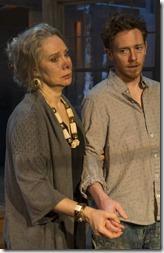
Exploration on mortality sometimes moving, often superficial
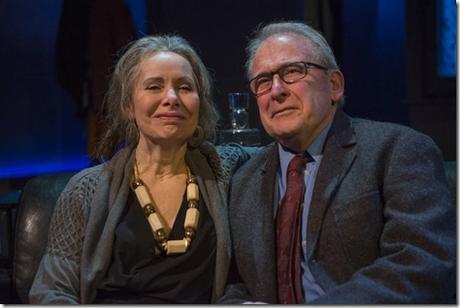
Review by Catey Sullivan
Winter is coming. We all know it, much as our denial of its inevitable onset a fundamental part of the human condition. Sooner or later, we all reach the point where there is far more behind us than ahead; the clock is nothing if not inexorably one directional. For Annis, the white-haired woman in Julie Jensen's sometimes moving but ultimately superficial exploration of one woman's winter, the days grow ever shorter. Dementia is setting in, just enough so that Annis is cruelly aware of just how much she's losing and how much she still stands to lose as the disease progresses.
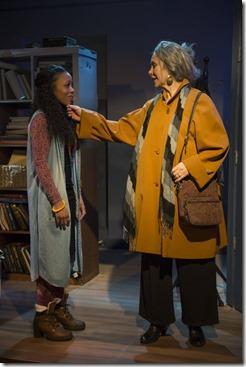
With Thanksgiving looming, Annis, Robeck , their granddaughter LD and their two grown sons Roddy and Evan have gathered for their traditional feast. But this year, much is amiss. The absence of a turkey is the most glaring indicator that Annis' mind is fading out. Jensen's plot hinges on Annis's moments of clarity: The elderly woman has a plan for ensuring that she'll have a dignified death rather than a long, torturous slide into oblivion.
Jensen's dialogue has flashes of vivid wisdom, including a line that sums up Annis' fear of not dying on her own terms. Nursing homes "are filled with people who swore they'd never live like this, living like this," Annis notes with bitter irony.
Annis intends to outmaneuver her decline by killing herself before she loses all control over her mind and body. She needs help to do this, and Jensen spends much of Winter exploring how Annis' family reacts to her increasingly urgent suicide plans and her pleas that they help her carry these plans out. Rodeck can't bring himself to face the issue, instead focusing on his mice and brushing Annis off with promises to discuss the matter "when the time comes." Older son Roddy is scheming to sell the house out from under his parents and trick them into moving into a nursing home where their lives will be safely supervised.
Evan, by contrast, is supportive of his mother's right to die on her own terms, and is enraged by Roddy's subterfuge. Then there's granddaughter LD (Martasia Jones), a young woman who has more experience with a parent's suicide than anyone else in the family. She's kind, compassionate and deeply sad about her grandparents' situation. She also just might be Annis' only hope for maintaining control over a failing mind and body.
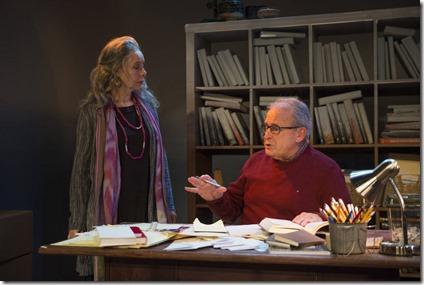
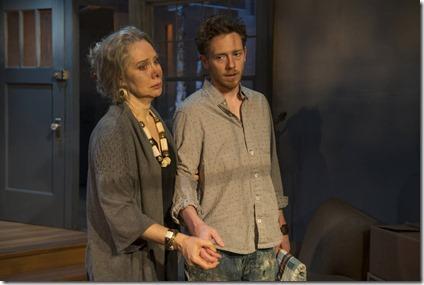
Directors Megan Carney and Mark Ulrich mostly get affecting performances out of their cast. The exception lies with Dan Flannery's Robeck: When he speaks, the production's pacing slows to a crawl and starts to feel as if it's moving in slo-mo. As Annis, Barbara E. Robertson creates an adequately interesting character, albeit not an especially memorable one.
The most memorable characters in are Steve Haggardand Sean Cooper as brothers Evan and Roddy, respectively. When the two face off over how to deal with their parents' declining health, sparks and pops with an energy that is sorely missing otherwise.
Cooper's Roddy is the slightly arrogant and repressed responsible brother, with a pent-up anger and frustration at life's inescapable responsibilities forever simmering just below the surface. Haggard's Evan is a relatively easy-going Peter Pan with an impish spark that you sense could turn devilishly reckless with the slightest encouragement. His is a world that seems to be anchored by tasty snack food, weed and, above all else, taking the path of least resistance in a life spent in the pursuit of the next funnest thing.
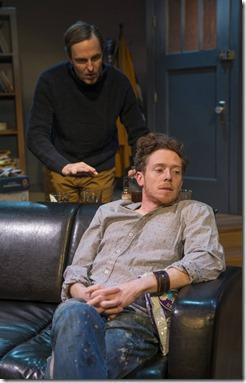
Jensen's final scene feels both highly unlikely and like a cop-out. Without spoilers, we'll simply say that LD's laid-back, almost offhand attitude is a stretch at best. If the plot hadn't indicated otherwise, you'd think LD and her grandmother were off to pick up the dry cleaning or some other innocuous, mundane errand.
In her discussion of assisted suicide, Jensen also fails to address something that anyone who has ever contemplated the issue comes up against - the fact that in much of the states, helping someone kill themselves is a felony punishable by years in prison. That's an issue that never arises in . It seems highly improbable that Roddy, Rodeck, Evan and LD wouldn't at least broach the topic. Roddy, in particular, is a highly educated scientist. Given Annis' continued insistence that he help her, it seems unlikely that the couple wouldn't talk about just how he could help without getting charged with a felony.
Jensen's drama will no doubt leave many pondering their own mortality, and whether it's possible to maintain control as one's mind orbits far out of control. But only skims the surface of the knotty, unnerving issues it brings up. Among those fortunate enough to survive youth, nobody escapes the ravages of aging. There's drama and depth in the story of how to deal with those ravages. But merely explores the tip of the iceberg.
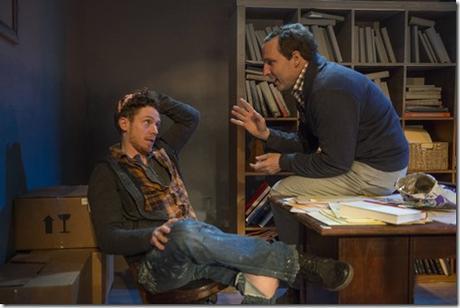
continues through February 11th at Rivendell Theatre, 5779 N. Ridge (map), with performances Thursdays and Fridays at 8pm, Saturdays 4pm & 8pm. Tickets are $38 (seniors, students, military, veterans: $28), and are available by phone (773-334-7728) or online through their website (check for half-price tickets at Goldstar.com ). More info at RivendellTheatre.org. (Running time: 85 minutes, no intermission)
Photos by Michael Brosilow
behind the scenes
Megan Carney , Mark Ulrich (co-directors), Jenniffer J. Thusing (stage manager), Elvia Moreno (stage design), Stephanie Cluggish (costume design), Michael Mahlum (lighting design), Robert Hornbostel (original music and sound design), Blake Burke (props design), Scott Cummins (fight choreography), Michael Brosilow (photography)
Tags: 17-0120, Barbara E. Robertson, Blake Burke, Catey Sullivan, Chicago Theater, Dan Flannery, Elvia Moreno, Jenniffer J. Thusing, Julie Jensen, Mark Ulrich, Martasia Jones, Megan Carney, Michael Brosilow, Michael Mahlum, post, Rivendell Theatre, Robert Hornbostel, Scott Cummins, Sean Cooper, Stephanie Cluggish, Steve Haggard
Category: 2017 Reviews, Catey Sullivan, New Work, Rivendell Theatre, World Premier

